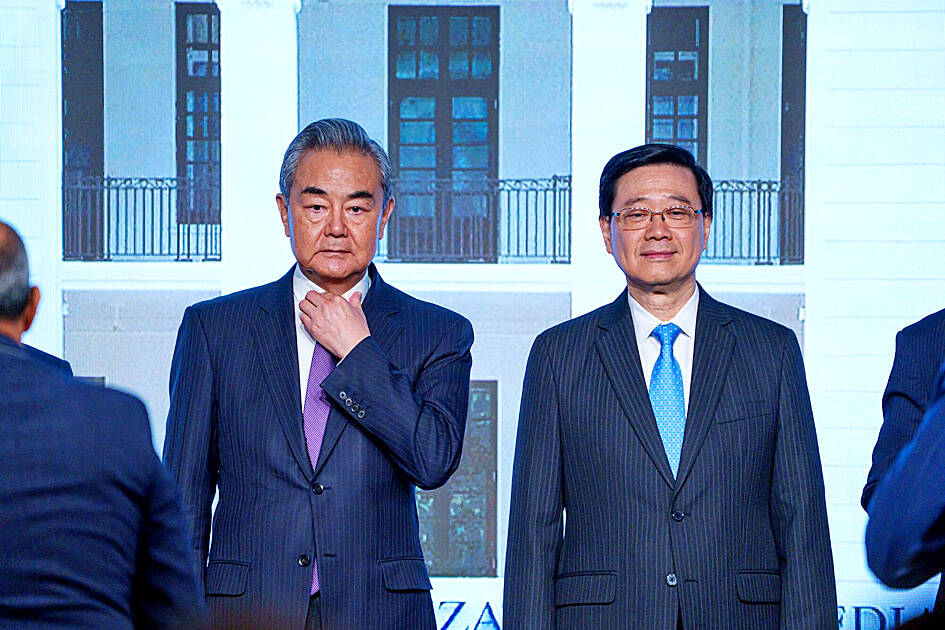China signed a convention setting up an international organization for mediation in Hong Kong yesterday that Beijing hopes would be on par with the International Court of Justice and bolster the city’s international credentials.
The move comes amid growing geopolitical tensions that have been exacerbated by US President Donald Trump’s global trade war and fuelled risks of a sharp worldwide economic downturn.
The mediation body aims to cement Hong Kong’s presence as a top center to resolve disputes between countries, Hong Kong Chief Executive John Lee (李家超) said earlier this week, adding that its status would be on par with the International Court of Justice and the UN’s Permanent Court of Arbitration.

Photo: Bloomberg
Indonesia, Pakistan, Laos, Cambodia and Serbia were among the countries attending the signing ceremaony. Representatives from 20 international bodies including the UN were also expected to join, public broadcaster RTHK said.
A video shown at the signing, which was presided by Chinese Minister of Foreign Affairs Wang Yi (王毅), said the scope of cases that would be handled include disputes between countries, between a country and nationals of another country, and between private international entities.
The mediation group could advance China’s influence internationally and promote a more assertive role for the world’s second-largest economy in global governance, although its success remains to be seen, some analysts said.
Natixis chief Asia Pacific economist Alicia Garcia-Herreo said the move was good news for Hong Kong, but added that arbitration centers in Chinese cities Xian and Shenzhen had not worked well.
“Hong Kong has been offered as an alternative, but I still think that borrowers, especially borrowers or anybody with a Belt and Road contract related or with a Chinese leg will feel less protected nowadays,” she said.
Hong Kong’s Secretary for Justice Paul Lam (林定國) said that the new body would help Hong Kong cope with challenges that arise when “hostile external forces are attempting to deinternationalize and defunctionalize” the city.

Right-wing political scientist Laura Fernandez on Sunday won Costa Rica’s presidential election by a landslide, after promising to crack down on rising violence linked to the cocaine trade. Fernandez’s nearest rival, economist Alvaro Ramos, conceded defeat as results showed the ruling party far exceeding the threshold of 40 percent needed to avoid a runoff. With 94 percent of polling stations counted, the political heir of outgoing Costa Rican President Rodrigo Chaves had captured 48.3 percent of the vote compared with Ramos’ 33.4 percent, the Supreme Electoral Tribunal said. As soon as the first results were announced, members of Fernandez’s Sovereign People’s Party

MORE RESPONSIBILITY: Draftees would be expected to fight alongside professional soldiers, likely requiring the transformation of some training brigades into combat units The armed forces are to start incorporating new conscripts into combined arms brigades this year to enhance combat readiness, the Executive Yuan’s latest policy report said. The new policy would affect Taiwanese men entering the military for their compulsory service, which was extended to one year under reforms by then-president Tsai Ing-wen (蔡英文) in 2022. The conscripts would be trained to operate machine guns, uncrewed aerial vehicles, anti-tank guided missile launchers and Stinger air defense systems, the report said, adding that the basic training would be lengthened to eight weeks. After basic training, conscripts would be sorted into infantry battalions that would take

GROWING AMBITIONS: The scale and tempo of the operations show that the Strait has become the core theater for China to expand its security interests, the report said Chinese military aircraft incursions around Taiwan have surged nearly 15-fold over the past five years, according to a report released yesterday by the Democratic Progressive Party’s (DPP) Department of China Affairs. Sorties in the Taiwan Strait were previously irregular, totaling 380 in 2020, but have since evolved into routine operations, the report showed. “This demonstrates that the Taiwan Strait has become both the starting point and testing ground for Beijing’s expansionist ambitions,” it said. Driven by military expansionism, China is systematically pursuing actions aimed at altering the regional “status quo,” the department said, adding that Taiwan represents the most critical link in China’s

‘REALLY PROUD’: Nvidia would not be possible without Taiwan, Huang said, adding that TSMC would be increasing its capacity by 100 percent Nvidia Corp CEO Jensen Huang (黃仁勳) on Saturday praised and lightly cajoled his major Taiwanese suppliers to produce more to help power strong demand for artificial intelligence (AI), capping a visit to the country of his birth, where he has been mobbed by adoring fans at every step. Speaking at an impromptu press conference in the rain outside a Taipei restaurant, where he had hosted suppliers for a “trillion-dollar dinner,” named after the market capitalization of those firms attending, Huang said this would be another good year for business. “TSMC needs to work very hard this year because I need a lot